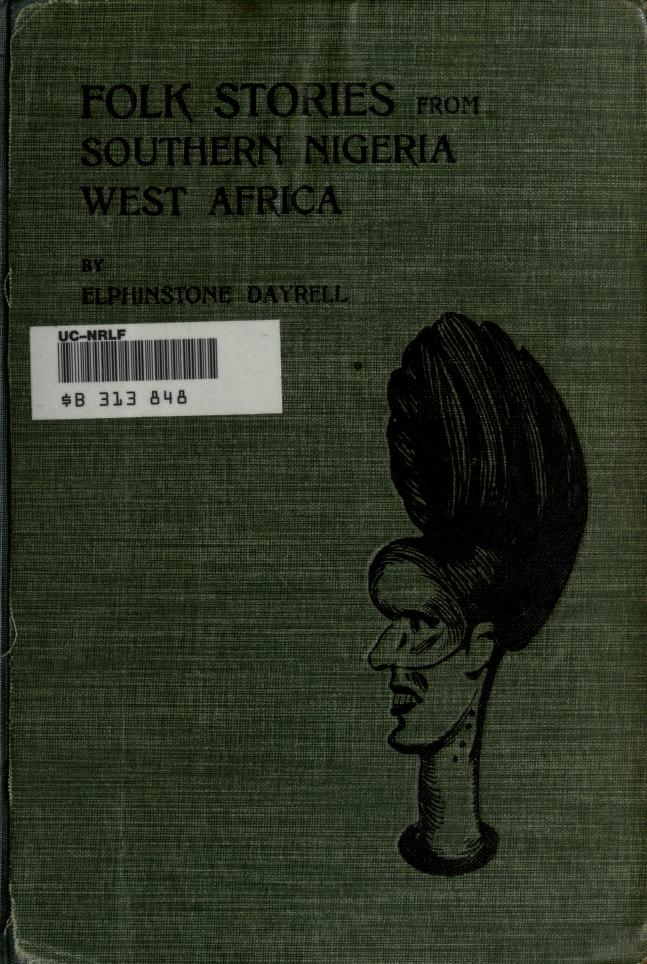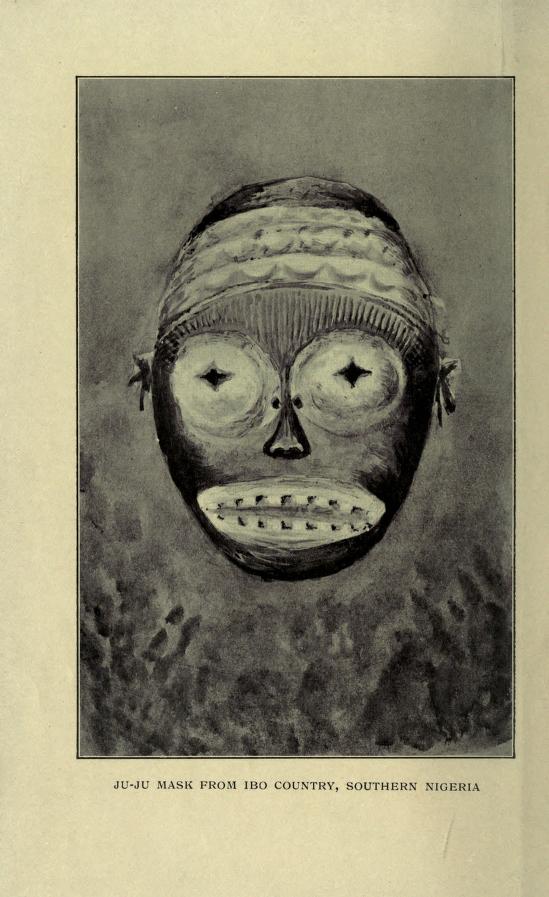Title of the work
Country of the First Edition
Country/countries of popularity
Original Language
First Edition Details
Elphinstone Dayrell, “The Woman with Two Skins” in Folk Stories from Southern Nigeria, West Africa, by Elphinstone Dayrell, F.R.G.S, F.R.A.I., District Commissioner, Southern Nigeria; with an introduction by Andrew Lang, London–New York–Bombay–Calcutta: Longmans, Green and Co., 1910, 11–19.
Available Onllne
archive.org (accessed: September 29, 2021).
Genre
Myths
Target Audience
Crossover (children and young adults)
Cover

Cover retrieved from Internet Archive (accessed: September 29, 2021).
Author of the Entry:
Divine Che Neba, University of Yaoundé 1, nebankiwang@yahoo.com
Peer-reviewer of the Entry:
Daniel A. Nkemleke, University of Yaoundé 1, nkemlekedan@yahoo.com
Hanna Paulouskaya, University of Warsaw, hannapa@al.uw.edu.pl

Elphinstone Dayrell
, 1869 - 1917
(Author)
Elphinstone Dayrell, a District Commissioner in the former Southern Nigeria, was a well-known writer who published in the domain of mythology and children’s stories. He was a writer, folklorist and a politician. He is the author of Folk Stories from Southern Nigeria, West Africa (1910), a collection with several children’s folktales and myths; The Ikon Stories From Southern Nigeria (1913).
Source:
Meneghelli Cassilhas, Fabrício Henrique and N'gana Yéo, "Dayrell, Elphinstone. Concerning the Fate of Essido and his Evil Companions; The Woman with Two Skins; The King's Magic Drum. Tradução, prefácio e notas," Acácia – revista de tradução, Florianópolis, 1, 2 (2018): 161-208 (accessed: April 9, 2020);
fairytalez.com (accessed: August 4, 2021).
Bio prepared by Chester Mbangchia, University of Yaoundé 1, mbangchia25@gmail.com
Summary
The Woman with Two Skins is a myth of the people of Calabar in Nigeria. This myth is centred on the mysteries surrounding Adiaha, the Spider’s daughter, who had two skins and married King Eyamba I. Her inner skin was beautiful, and her outer skin was ugly. People were only aware of the outer skin because her mother had warned her not to expose her inner one. She could unmask herself at night to sleep and veil herself at sunrise. She also promised her mother not to expose it until a certain moment arrived. According to the myth, Eyamba was a brave and unbeatable warrior who defeated and captured abled men and beautiful young girls: he made the boys his slaves. Eyamba had two hundred wives, but not one of them gave him a son. Consequently, his subjects pleaded with him to marry the Spider’s daughter, Adiaha. Although the King did not like her because she was ugly, he accepted her as a wife. After his marriage to the girl, his other wives rejected her because of her ugliness. This pressed the King to build her hut separately. His marriage to a new wife soon developed envy in his head wife, who knew about the Spider’s daughter’s double skins. She contacted a juju man*, offered him 250 rods in exchange for charms to mix in the King’s food and make him forget about his wife. Her potion works, and the King does not recognise his wife for four months. This pushes Adiaha to return to her father, who takes her to another juju, who gives them a potion to put in the King’s food to reverse the previous charm. That done, the King recognizes her.

Illustration retrieved from Internet Archive (accessed: September 29, 2021).
Adiaha visited the King for three nights, pulled off her ugly skin, and the King admired her. By the fourth night, she was pregnant. Months passed, and she gave birth to a son. All in the village, especially the King’s other wives, were surprised because she only bore only a single child, contrary to her mother’s giving birth to many children at once. The King’s head wife’s jealousy pushes her to visit the juju man for medicine that made the King ill. As requested by the jealous wife, the medicine forces the King to go to the same traditional seer, who, in turn, persuades him to throw his son (presumed to be the cause of his malady) into the river. The King does as he is instructed, making Adiaha cry for a long time, without knowing that more trouble awaited her. The head wife returned to the traditional seer and took another potion to make the King forget Adiaha. Again, her father took her to the water juju** for counter charms to the previous spells. Fortunately for them, the water juju gives them a son that he had rescued in the river.
Time passes, and she gives birth to a daughter. Again, the King’s head wife charms the King to throw the child away and forget her. Which he does, and, again, the water juju rescues the girl child and thinks about punishing the jealous wife. To achieve his aim, he instructs the men in the village to organise wrestling matches in the marketplace every week. They do as he says, and he goes to them again to organise a big wrestling match that will involve all the strongest men of the village. He prepares the King and Adiaha’s son to go to the match – the King has to reward the day's winner. The water Juju comes on the final day of the matches. However, in the match, the King’s son surprises everyone by fighting like the King and becoming the victor. The King rewards him with clothes and money and invites him to dinner. When he arrives, he sits next to the King to eat a magnificent meal that the King’s wives prepared. During the dining, the King’s jealous wife admires the boy and tries to be friendly. She starts thinking that her husband is old and that she needs someone young and strong. However, the boy ignores her and returns to the water juju to tell him everything that happened. The water juju tells him to return to the King and ask for a favor: the whole country should be called together to decide everyone’s fate; those who will be found guilty will be sentenced to death by the Egbos. The Juju sends him to tell his mother that that day will be the last one she wears her ugly skin. She must unveil herself before the whole country.
The day of the trial arrives, and Adiaha unmasks herself, but no one recognises her. She sits close to her son, who brought his sister, rescued by the water juju. She recognizes her daughter and is happy but is careful not to let anyone notice it. When the King and his head wife arrive, people greet him customarily. He then declares the reason for their gathering and calls the young boy out. He walks to the King and asks whether he is worthy of being King. All the people nod and answer in affirmation. Then, he brings out his sister and asks whether she is worthy of being a chief’s daughter, and the people confirm that she is. He proceeds by calling his beautiful mother out and asks whether she is not beautiful enough to be the King’s wife and all there said she was. At this point, the boy points to the jealous wife, tells the whole story to the people and allows them to judge who should be the one punished by the Egbos.
The King is happy to have his family back. He asks the Egbos to punish the jealous woman. As instructed, the Egbos take her to the evil forest, tie her up, whip her, burn her and throw her ashes into the river. The King rejoices for a hundred and sixty-six days and declares that all women who try to put charms on their husbands will be instantly killed. He builds three compounds: one for his son, another for his daughter and one for his wife. He places both male and female slaves in all of them. Finally, peace reigns in the country as the King lives happily with his family until he dies and is replaced by his son.
* Medicine man with mystical power.
** Water spirit.
Analysis
The image of the Juju and spider are central in the myth. The Juju, in traditional African religion, embodies medicine, spirits and mystical power. It is both a positive and negative concept. Positive, when used for healing, protection and defense, negative, when used to kill, harm, or commit other terrorist acts. The people involved in this practice obtain their powers from the supernatural world or are trained and initiated. Generally, they are called medicine people or spirits, and they can often be found at shrines, the sea, in the forest and other sacred areas in the world. Juju people can defy science in their art, just as they can transcend from the natural to the supernatural world and sometimes have access to people’s thoughts. They produce potions and their antidotes. In short, they are all-powerful but subjects to the supreme deities and some divinities. For this reason, as the myth shows, individuals use their art to satisfy their wants. The King, Adiaha, and others used these juju people, spirits and products to their own end.
In certain world mythologies, the spider is characteristically tricky and manipulative. The main characters in such myths, be they human or animal, just like a spider, trap, trick and manoeuvre others. The attempts to fine-tune things in their favor are often encountered by resistance and hatred. Adiaha acts as the spider woman in this myth. Using her ability to mask herself, she pushes the other spouses to the periphery, toys with her husband with the assistance of a charm given to her by the water spirit through her father's directives. Her different appearances sow seeds of discord and confusion in the polygamous home, where she later emerges champion, with the head wife killed.
The victory of Adiaha can be likened to that of Anansi, a mythic trickster among the Ashanti of West Africa. Anansi outwits Nyankopon (the sky God) by tricking and capturing all the powerful animals in the kingdom as a challenge. In the end, he announces that all the animals in the kingdom are his subjects and not Nyankopons’. Like Adiaha, who conquers her co-spouses and becomes the preferred queen in the kingdom, Anansi ends up usurping the authority of the sky god over his people. The two skins can equally be read metaphorically as the different characters of Adiaha that she uses to achieve her life objectives, as is the case with most tricksters.
Similar characters in other spider mythologies are: Djieien in Seneca mythology and Iktomi in Lakota mythology. These figures are cultural depictions of spiders, who share similar attributes with Adiaha in the Calabar pantheon in Nigeria.
Further Reading
Raffin P. and J. Sweeney, African Folktales and Sculptures, New York: Bollingen Foundation, 1952.
Valentin, Peter, Jujus in the Forest Area of West Cameroon, Basel: Basler Afrika Bibliographien, 1980, online: books.google.pl (accessed: September 29, 2021).
Quarcoopome, T. N. O., West African Traditional Religion, Ibadan, African Universities Press, 1987.
Addenda
Origin/cultural background:
The Igbos are the second-largest group of people in Southern Nigeria, part of the Kwa sub-family of the Niger-Congo language family. They maintain fundamental beliefs that explain their origins, and their relationship with their ancestors, spirits and gods and supreme deity, Chukwu Abiama. They consider reincarnation as a binding force between the living and the dead. In addition, they firmly believe in the role of extended families in social cohesion, and perform periodic rituals for diverse purposes. Lastly, they firmly adhere to the rites of passage through birth, circumcision, marriage, and death.
References:
Njoku, John E. Eberegbulam, The Igbos of Nigeria: Ancient Rites, Changes, and Survival, Lewiston, N.Y.: E. Mellen Press, 1990.
Igbo, everyculture.com (accessed: September 29, 2021).


